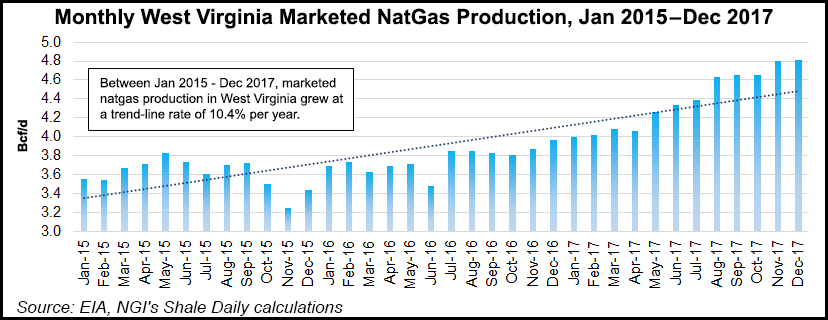Regulatory | NGI All News Access | NGI The Weekly Gas Market Report
West Virginia Governor Reverses Position, Would Sign Co-Tenancy Legislation If Passed
In what’s been a stressful week for supporters of a delicate proposal to help West Virginia natural gas producers develop larger tracts of land with co-tenancy legislation, Republican Gov. Jim Justice backed off threats that he would veto the legislation unless the industry agreed to a higher severance tax rate.

The administration has been dealing with angry teachers who went on strike last week to demand better pay and benefits. Justice proposed trading co-tenancy and joint development for an increased severance tax to increase revenue for pay raises, drawing pointed criticism from the industry and other supporters for intervening as the legislation nears passage.
After meetings on Tuesday, Justice struck a tentative agreement with union leaders for a 5% raise starting in July and to form a task force that would explore fixes for the Public Employees Insurance Agency. Teachers were expected back in the classroom on Thursday, but demonstrations continued on Wednesday over dissatisfaction with the agreement and a lack of clarity on how the legislature would receive the proposal.
Still, Justice said he would not attempt to tie co-tenancy to a higher severance tax. “I’m going to have to move off my position of vetoing co-tenancy if it comes to me,” he said late Tuesday during a press conference. “And I am very hopeful that if we move forward, we’ll find ways to — whether it be joint development, or whatever it may be in the gas industry — raise severance” on a tiered basis.
Shortly after he took office last year, Justice proposed tiering the state’s severance tax for natural gas and coal production that would scale the rate up or down depending on prices. Justice said he hopes to pay for teacher raises and 3% raises for state employees by revising state revenue estimates upwards, which he said would cover the costs.
The co-tenancy legislation, HB 4268, passed the House earlier this month. It cleared the Senate Judiciary Committee late Tuesday unamended and was sent to the floor. Despite the back and forth, proponents of the bill said Tuesday that they believe it could pass the Senate this week.
Similar legislation to enact forced pooling has consistently failed over the years, so the industry watered the latest bill down and has dropped the pursuit of joint development, which would have allowed unconventional drilling to occur on land with older leases without modifying them. The current bill would require a producer to obtain consent from 75% of the mineral rights owners of a single tract of land. It’s not uncommon in the state for dozens of people to own a single piece of property, which has prevented some drillers from developing more of their assets.
West Virginia is the only major extraction state that still allows a minority interest owner to prevent a majority from allowing drilling.
© 2024 Natural Gas Intelligence. All rights reserved.
ISSN © 2577-9877 | ISSN © 1532-1266 | ISSN © 2158-8023 |
